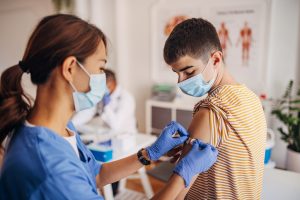 August is National Immunization Awareness Month, and we’re here to help you learn more about what makes getting vaccinated so important, which immunizations you should receive, and what they protect you against.
August is National Immunization Awareness Month, and we’re here to help you learn more about what makes getting vaccinated so important, which immunizations you should receive, and what they protect you against.
Vaccinations against prevalent, dangerous diseases are an important part of protecting both your own health and the health of those around you. Issues like pneumococcal disease, hepatitis A and B, chickenpox, and more can introduce potentially lifelong complications that may reduce your quality of life or even shorten it.
The benefits of vaccinations hold true at any age, though some immunizations are more important at certain ages than others.
Children whose immune systems are still developing, for instance, need them not only as a protective measure for themselves, but often as a requirement for enrolling in school and participating in other activities. As another example, adults over 60 years of age may still need pneumococcal vaccines, seasonal flu vaccines, and more.
Though the list of necessary immunizations evolves as new diseases are discovered and researched, the most common vaccinations recommended by the CDC include:
- HepA, HepB (Hepatitis A and B)
- DTaP (Diphtheria, tetanus, and whooping cough)
- Hib (Haemophilus influenza type B)
- IPV (Polio)
- PCV (Pneumococcal)
- RV (Rotavirus)
- Varicella (Chickenpox)
- MMR (Measles, mumps, and rubella)
- Influenza (flu)
- Meningococcal conjugate
- HPV
- Zoster
If you or your child aren’t up to date with your immunizations, schedule an appointment with a physician at Flushing Hospital’s Department of Internal Medicine or your primary care physician as soon as possible.
All content of this newsletter is intended for general information purposes only and is not intended or implied to be a substitute for professional medical advice, diagnosis or treatment. Please consult a medical professional before adopting any of the suggestions on this page. You must never disregard professional medical advice or delay seeking medical treatment based upon any content of this newsletter. PROMPTLY CONSULT YOUR PHYSICIAN OR CALL 911 IF YOU BELIEVE YOU HAVE A MEDICAL EMERGENCY.
